|
|
|
Sort Order |
|
|
|
Items / Page
|
|
|
|
|
|
|
| Srl | Item |
| 1 |
ID:
148381
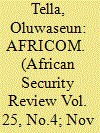

|
|
|
|
|
| Summary/Abstract |
The United States (US) Africa Command (AFRICOM) was launched in 2007, ostensibly to foster African security. Rather than focusing on traditional military operations, AFRICOM also embraces non-military activities such as humanitarian aid and African development. This begs the question as to what type of power (hard or soft) the US intends to wield through AFRICOM. Several US official statements have emphasised the soft power attributes of this military project. To this end, this article seeks to respond to two fundamental questions. First, is AFRICOM a soft power project? Second, how, if at all, has AFRICOM enhanced perceptions of the US in Africa? The article concludes that sceptical and negative perceptions of AFRICOM inhibit its soft-power objective of winning the hearts and minds of the African people.
|
|
|
|
|
|
|
|
|
|
|
|
|
|
|
|
| 2 |
ID:
161617
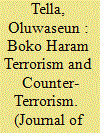

|
|
|
|
|
| Summary/Abstract |
Given terrorists’ use of violence in pursuit of their objectives and violent counter-terrorism measures, terrorism is not often associated with soft power. Nevertheless, terrorist organisations subscribe to ideologies that are appealing to certain individuals and/or segments within their immediate environment and beyond. Similarly, counter-terrorism initiatives that embrace the utility of soft power might be more successful than those that rely on the use of naked force. While the soft power of terrorist organisations has received scant attention, there has been modest scholarly inquiry into a soft power approach to counter-terrorism. However, no comprehensive research has been conducted on the place of soft power in Boko Haram’s activities and the Nigerian government’s efforts to end their campaign. This article offers a new perspective to the burgeoning literature on Boko Haram terrorism by examining whether or not it possesses elements of soft power that are appealing to certain Nigerians. It also examines if the Nigerian government has adopted a soft power approach in its counter-terrorism efforts. The article concludes that effectively tackling the sect will require a smart power strategy
|
|
|
|
|
|
|
|
|
|
|
|
|
|
|
|
| 3 |
ID:
141283
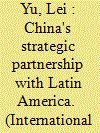

|
|
|
|
|
| Summary/Abstract |
China has over the last two decades been committed to creating a strategic partnership with Latin American states by persistently extending its economic and political involvement in the continent. China's efforts in this regard reflect not only its desire to intensify its economic cooperation and political relations with nations in Latin America, but also its strategic goals of creating its own sphere of influence in the region and enhancing its ‘hard’ and ‘soft’ power in order to elevate China's status at the systemic level. With access to Latin American markets, resources and investment destinations, China may sustain its economic and social progress that bases its long cherished dream of restoring its past glory of fuqiang (wealth and power) and rise as a global power capable of reshaping the current world system. The enormous economic benefits deriving from their economic cooperation and trade may persuade Latin American nations to accept the basic premise of China's economic strategy: that China's rise is not a threat, but an opportunity to gain wealth and prosperity. This will help China gain more ‘soft’ power in and leverage over its economic partners in Latin America, and thereby help it to rise in the global power hierarchy.
|
|
|
|
|
|
|
|
|
|
|
|
|
|
|
|
| 4 |
ID:
149720
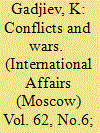

|
|
|
|
|
| Summary/Abstract |
AT ALL TIMES, the best minds were talking about a world free from wars, conflicts and bloodshed. In modern history, market economy and political democracy made this ideal even more tempting. From the very beginning of modern history, people have been seeking answers to the sacramental questions: How do liberalism and freedom, trade and free competition, democracy and market economy affect their lives? Are they a source of conflicts or do they inspire cooperation, preserve peace or breed wars? How do democracy and political freedom correlate with conflicts and wars? And, finally: Does democracy stimulate conflicts and wars?
|
|
|
|
|
|
|
|
|
|
|
|
|
|
|
|
| 5 |
ID:
115715
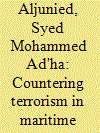

|
|
|
|
|
| Publication |
2012.
|
| Summary/Abstract |
There are two main approaches in the global war on terrorism (GWOT). On the one hand, the hard approach entails physical engagements which cripple destructive plans by terrorists, such as bombings. Through the legislative, judiciary and executive arms of the state, the modern state uses methods such as arrest, surveillance, intelligence and detention to cripple damaging initiatives by terrorists. The soft approach, on the other hand, attempts to debase terrorist ideology through a counter-ideology discourse against radical ideologies which encourage political violence. Through the soft approach, Muslim organizations and leaders debunk terrorist's ideology of hate and violence. This article attempts to elucidate efforts made by governments, and of particular interest are contributions made by Muslim leaders in maritime Southeast Asia to counter the ideology and activities of terrorism.
|
|
|
|
|
|
|
|
|
|
|
|
|
|
|
|
| 6 |
ID:
095201
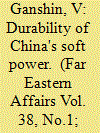

|
|
|
|
|
| Publication |
2010.
|
| Summary/Abstract |
After successfully hosting the Olympic Games, it seems as though China now finds itself in a new process of self-identification. With the proliferation of crisis situations globally, China's earlier status and weight in international affairs could hardly serve to strengthen its international positions. Meanwhile, Beijing states resolutely that it will never become a "superpower," and that its ascent and marshalling of might presents no threat whatsoever to other members of the world community. China intends to conquer its new heights by exclusively peaceful means, with the help of so-called soft power. To accomplish this, it is ready in the future to seek mutual understanding with other nations and peoples through increased cultural exchanges, promoting the attractiveness of its model of socioeconomic development, and convincing others of its sincerity.
|
|
|
|
|
|
|
|
|
|
|
|
|
|
|
|
| 7 |
ID:
125365
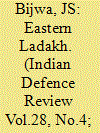

|
|
|
|
|
| Publication |
2013.
|
| Summary/Abstract |
The Armed Forces are India's "hard-power" assets and not a tool for diplomacy on the borders. Deployment of an armed force to support a diplomatic effort is axiomatic as it lends strength to diplomacy. Should "soft power" of diplomacy fail, then the will to suitably demonstrate use of "hard power" must not be found wanting. India is a Nation tugging at its leash to surge forward in all arenas of development. Without throwing caution to winds, there is a requirement to be less tentative and more assertive. India's national interests must be paramount. At stake here are the aspirations of a young generation for a bright progressive future.
"Perform necessary action; it is more powerful than inaction; without action, you even fail to sustain your own body." -Mahabharata
|
|
|
|
|
|
|
|
|
|
|
|
|
|
|
|
| 8 |
ID:
082929


|
|
|
|
|
| Publication |
2008.
|
| Summary/Abstract |
Is the United States inevitably in decline? After the foreign policy controversies of the George W. Bush years, a new consensus declares the end of American dominion. In this article this conventional wisdom is challenged. The US constitutes an 'exceptional empire' and, despite the recent rise of powers such as the EU, China and India, the four foundations of this distinctive empire remain robust. First, the US still exhibits global predominance in hard power. Second, the essentially unipolar international order shaped by Washington remains resilient. Third, neither the rise of 'anti-Americanism' nor the alleged decline of US 'soft power' endanger its predominance. Fourth, the US political class is committed to preserving American primacy after Bush. No other power is currently in range of competing with the US for global influence. Moreover, each faces powerful internal weaknesses and external threats at least as significant as those facing the US. America's global predominance in hard and soft power do not translate into omnipotence. Nor does predominance promise an error-free foreign policy. The US nonetheless continues to defy both history and theory
|
|
|
|
|
|
|
|
|
|
|
|
|
|
|
|
| 9 |
ID:
151015
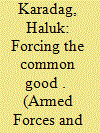

|
|
|
|
|
| Summary/Abstract |
Hard power, the unorthodox foreign policy mechanism, has emerged recently as a complex agency that uses military power to regulate diplomatic relations between military and civilian actors. Although national governments use hard power rather frequently to influence foreign public opinions, the field’s scholarship tends to downplay the role of military instruments in the development of public diplomacy. Almost all armed forces contribute to various public diplomacy efforts by applying basic tools, including humanitarian-relief operations and construction works, and international military education and training programs. This article analyzes these tools in the context of soft power and public diplomacy and demonstrates the impact of military power on public diplomacy. It also reconstructs the effective time frames of public diplomacy works of the military by introducing a novel pattern to understanding these works.
|
|
|
|
|
|
|
|
|
|
|
|
|
|
|
|
| 10 |
ID:
110680
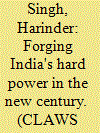

|
|
|
| 11 |
ID:
186876
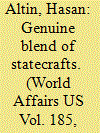

|
|
|
|
|
| Summary/Abstract |
Power transition in the international order and the position of China in this order have triggered ramifications in China's foreign policy strategy toward the Middle East and North Africa (MENA) region. Its foreign policy approach has evolved from strict non-intervention to an assertive policy at the international level and constructive engagement at the regional level. China has simultaneously been applying both soft and hard power to protect its national interests in MENA. This study aims to assess China's four-pillar MENA policy from the perspective of its smart power strategy by examining its hard power means and soft power tools.
|
|
|
|
|
|
|
|
|
|
|
|
|
|
|
|
| 12 |
ID:
179206
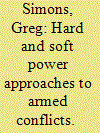

|
|
|
|
|
| Summary/Abstract |
Armed conflicts are generally associated with the use of hard power for coercing and forcing an opponent to do something against its will in a situation where war is an extension of politics. However, there are many scholarly observations about the important role of soft power in armed conflicts, the interaction between hard and soft power, and the effects on one another within the framework of an armed conflict. This paper explores two specific armed conflicts, the 2003 U.S.-led military intervention in Iraq and the 2015 Russian intervention in Syria. Various aspects of hard and soft power approaches are discussed, and the outcome of military operations for the national soft power potential is analyzed. The results of the study show that whereas the Iraq War came as a disaster for the U.S., the military operation in Syria—despite dire predictions—created strengths and opportunities for Russia in international relations.
|
|
|
|
|
|
|
|
|
|
|
|
|
|
|
|
| 13 |
ID:
110452
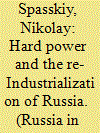

|
|
|
|
|
| Publication |
2011.
|
| Summary/Abstract |
Since the time of Kievan Rus, Russia has been a key element of the world order through a multitude of circumstances. Therefore, in strengthening Russia we will strengthen the entire world order and render it more durable. In the overall scheme of things, this step will meet the real strategic interests of all responsible members of the international community, including the EU, the U.S., China and India.
|
|
|
|
|
|
|
|
|
|
|
|
|
|
|
|
| 14 |
ID:
158848


|
|
|
|
|
| Summary/Abstract |
According to conventional wisdom, strategic natural resources like oil are harmful to international peace. Nonetheless, there is little comparative work on the link between resources and interstate conflicts. Analyzing the impact of oil on militarized interstate disputes on the dyadic level of analysis for the period from 1946 to 2001, this paper shows that oil in fact influences the conflict potential between countries. Results of logistic regressions suggest that absolute oil abundance as well as oil dependence increase the risk of dispute involvement. We find that in particular oil production, oil reserves, oil dependence, and oil exports are associated with a higher risk of initiating conflict while countries enjoying large oil reserves are more frequently the target of military actions. Furthermore, our analysis indicates that the presence of large oil deposits also increase the intensity of international disputes. Relative measures of oil abundance such as per capita oil production, in contrast, do not affect countries’ dispute proneness. Increased militarization, the internationalization of intrastate violence, the indulgence of an oil-dependent world community and so-called “classical resource wars”—rather than domestic political mechanisms inherent to the rentier state—are likely to explain our findings.
|
|
|
|
|
|
|
|
|
|
|
|
|
|
|
|
| 15 |
ID:
115750
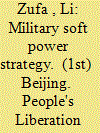

|
|
|
|
|
| Edition |
1st
|
| Publication |
Beijing, People's Liberation Army Press, 2012.
|
| Description |
329p.
|
| Contents |
Text in Chinese Language
|
| Standard Number |
9787506563345
|
|
|
|
|
|
|
|
|
|
|
|
Copies: C:1/I:0,R:0,Q:0
Circulation
| Accession# | Call# | Current Location | Status | Policy | Location |
| 056879 | 355.033551/ZUF 056879 | Main | On Shelf | General | |
|
|
|
|
| 16 |
ID:
157890
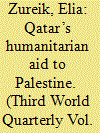

|
|
|
|
|
| Summary/Abstract |
The purpose of this paper is to document Qatar’s recent contribution of humanitarian aid to the Palestinians. We consider Qatar as an example of a mini state that relies on its wealth and soft power to further its interests in the Middle East and support a beleaguered Arab-Muslim state. The paper carries out analysis of Arabic newspapers and other documentary evidence to contextualise and estimate Qatar’s financial contribution 2010–2016. Contextualising Qatar’s aid necessitates considering Israel’s military control of the Palestinian Territories, and its ability through hard power to regulate the inflow of aid to Palestine. The paper concludes by calling for adopting the political economy perspective in dealing with humanitarian aid.
|
|
|
|
|
|
|
|
|
|
|
|
|
|
|
|
| 17 |
ID:
138976
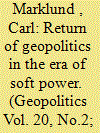

|
|
|
|
|
| Summary/Abstract |
This paper looks at how Swedish political scientist Rudolf Kjellén (1864–1922) conceived of the relationship between nature and culture, between material and immaterial power as well as the role of soft power, geopolitical imaginary and competitive identity in off-setting potentially unfavourable geopolitical conditions for small and medium-sized states. It is argued that with regard to small states, Kjellén did not maintain a consistent separation between “soft” cultural resources of power and “hard” laws of nature. Rather, he placed the mutually constitutive tension between geography (nature) and politics (culture) at the centre of his politico-scientific analysis, arguing that active “biopolitics” could supplement geopolitics. In Kjellén’s conception, cultural and natural resources are instruments of an otherwise integrated notion of power which challenges the contemporary separation between hard and soft power.
|
|
|
|
|
|
|
|
|
|
|
|
|
|
|
|
| 18 |
ID:
123676
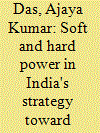

|
|
|
|
|
| Publication |
2013.
|
| Summary/Abstract |
India has reinforced its strategic objectives in Southeast Asia in response to the rise of China and its growing influence in Southeast Asia. 1 The new geopolitical focus on the region is complemented by India's increasing interest in economic integration with it. This has produced a new kind of strategic relationship that is based largely on the power of attraction rather than that of coercion. 2 India has utilized its rising economic and military resources, normally understood as "hard power," in the form of "soft power" with substantial success. While analysts tend to make a sharp distinction between the hard power of military and economic instruments available to the state, this article shows that there is a substantial overlap between them and that the "soft" aspects of hard power play a significant role in meeting India's strategic objectives. It also examines how purely soft power resources (such as culture) play a complementary role. Taken together, India's soft power-based on military as well as non-military resources-underlies its strategy of building strong defense and strategic links with Southeast Asia.
|
|
|
|
|
|
|
|
|
|
|
|
|
|
|
|
| 19 |
ID:
157688
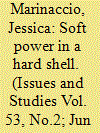

|
|
|
|
|
| Summary/Abstract |
In 1967, Taiwan began dispatching a portion of its navy, the ROC “Fleet of Friendship,” on goodwill missions to allied nations to strengthen diplomatic friendships. Since that time, one of the major areas of focus for fleet visits has been Taiwan’s allies in the Pacific. In an attempt to move beyond emphasis on the China–Taiwan rivalry in the Pacific, this paper examines firsthand sources to advance three modes of contextualizing the Fleet of Friendship and reveals various layers of historical, pragmatic, and symbolic meaning that exist beyond simple competition with China. First, with specific focus on the performances presented during the fleet’s goodwill visits, this paper contextualizes fleet performances within Taiwan’s unique history, including an extended Martial Law period and tensions regarding the concept of “multiculturalism.” Second, the paper more broadly examines the fleet as a holistic entity on three levels: a hard-power superstructure in which the fleet serves as a reminder of military power; soft-power content in which the activities of the fleet run at cross-purposes with its symbolic military nature; and a hard-power underbelly, in which Taiwanese embassy descriptions of fleet performances and Pacific reporting evince concepts of frenzy, threat, and potential violence. Finally, the paper highlights ulterior motives interlaced within the fleet’s goodwill tours and contextualizes these motives based on other aspects of Taiwan’s diplomacy in the Pacific that demonstrate similar trends. The article evinces the importance of situating analysis of Taiwan’s cultural diplomacy and soft power within a variety of contexts and demonstrates the nuance inherent within Taiwan’s Pacific diplomacy.
|
|
|
|
|
|
|
|
|
|
|
|
|
|
|
|
| 20 |
ID:
126317


|
|
|
|
|
| Publication |
2013.
|
| Summary/Abstract |
In the inter-war years, it was important for Britain to preserve friendly relations and influence throughout its empire to maintain competitive advantage in markets in a time of austerity. One way of doing this was through the export of cultural imperialism, and colonial administrations in particular were keen to maintain their hold over indigenous populations by preserving the cultural ideologies and brand (and thereby associated power) of the mother country. David Hammond argues that the military band was a particularly effective and economical resource for this: through the expression of British symbols, routines and rituals, they epitomised the British control systems and power structures without the need for 'hard power' engagement.
|
|
|
|
|
|
|
|
|
|
|
|
|
|
|
|
|
|
|
|
|